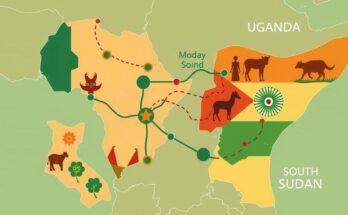The eastern Democratic Republic of Congo has faced conflict for over 30 years, rooted in issues stemming from the 1994 Rwandan genocide. The M23 rebel group has recently intensified fighting, particularly in Goma, a vital trading city. Accusations of Rwandan support for the rebels complicate the situation amidst ongoing ethnic tensions and the quest for control over rich natural resources.
The ongoing conflict in the eastern Democratic Republic of Congo (DRC) has its roots in a history of violence, particularly following the 1994 Rwandan genocide. Armed groups have long vied for control over this mineral-rich region, leading to significant instability that has involved multiple neighboring countries over the past three decades. Currently, the M23 rebel group has advanced into Goma, a crucial city located near the Rwandan border, heightening tensions and igniting fears of broader conflict.
Located in a strategic area near Lake Kivu, Goma is home to over a million residents and serves as a key trading hub. The M23 rebels assert their control over the city, leading to mixed reports about the situation from both the Congolese government and rebel forces. This power struggle is closely tied to the vast mineral wealth in the region, including precious resources needed for technology.
The M23 comprises mainly ethnic Tutsis, who argue that they are fighting to protect their rights. Their name references a peace deal signed on March 23, 2009, which they claim has been violated repeatedly. The group gained significant territory shortly after its formation in 2012, including Goma, prompting international condemnation and accusations of human rights abuses.
Following their expulsion from Goma in subsequent military engagements, M23 combatants reintegrated into the Congolese army under promises of protection for Tutsi interests. However, in 2021, the M23 resumed hostilities, claiming that these assurances had not been honored. The group’s resurgence reflects longstanding grievances and deep-rooted ethnic tensions.
Rwanda’s involvement in the conflict remains contentious. Although the Rwandan government denies direct support for the M23, accusations of its military assistance have persisted since 2012, with reports suggesting that Rwandan troops are operating alongside the rebels. Kigali frames the situation as a security concern, citing threats to its territorial integrity from conflict just across the border.
The conflict is deeply intertwined with the legacy of the 1994 Rwandan genocide, during which an estimated 800,000 Tutsis were killed. The aftermath saw Hutu extremists fleeing to the DRC, sparking ethnic tensions that persist today. Rwanda’s military interventions aimed at neutralizing Hutu groups responsible for the genocide have further complicated the situation, with ongoing threats from the Democratic Forces for the Liberation of Rwanda (FDLR) exacerbating instability.
In conclusion, the conflict in eastern DRC, particularly around Goma, is driven by a complex interplay of ethnic tensions, historical grievances, and competition for valuable natural resources. The regional involvement of Rwanda and the continuation of armed group activities underline the challenges faced in achieving lasting peace and stability in the region.
The conflict in eastern DRC has spanned over three decades, primarily influenced by the aftermath of the Rwandan genocide of 1994. The region is home to vast mineral resources, which have attracted numerous armed groups competing for dominance. Such instability has historically drawn in neighboring countries, leading to massive humanitarian crises and loss of life during what were termed Africa’s World Wars. The current situation, marked by the resurgence of the M23 rebels, continues to threaten peace in this volatile region.
The conflict in the eastern DRC, spotlighted by recent advances by the M23 rebel group into Goma, remains a stark reminder of the region’s complicated history marked by ethnic strife and resource competition. Rwanda’s alleged involvement complicates the dynamics further, emphasizing the need for a thorough understanding of local grievances and international pressures. As the situation evolves, achieving peace necessitates dialogue and mutual recognition of rights among all groups involved.
Original Source: www.bbc.com




